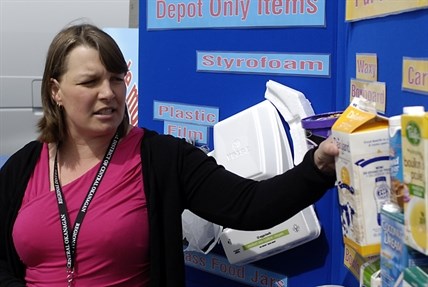
Waste reduction facilitator Cynthia Coates goes over which items can be recycled curb-side and which will have to be taken to a depot after May 19.
(ADAM PROSKIW / iNFOnews.ca)
May 08, 2014 - 3:30 PM
KELOWNA – Central Okanagan residents with a large collection of plastic shopping bags under their sinks have only ten days left to recycle them curb-side.
As of May 19, plastic bags will no longer be accepted in blue bins, and residents will have to take them to a recycling depot in their area.
The announcement follows an agreement between the Regional District of the Central Okanagan and a Vancouver-based company, Multi Material BC. It effectively makes local municipalities contractors when it comes to recycling.
Peter Rotheisler, Environmental Services Manager with the RDCO, says the program represents a significant financial shift in responsibility from local government and residents to industry that will ultimately lead to savings for residents.
“That revenue we (previously) got from residents is now coming from MMBC,” he says. “(Industry) will be charging residents when they’re consuming the products or purchasing the materials.”
In most cases, this means the manufacturer will pay the fees, not the consumers, however the additional costs will likely get passed on to consumers eventually.
Rotheisler says the program will mean more materials will be reused and more money will be saved.
“Historically, our curbside and depot programs have cost just over $3 million to operate on an annual basis,” says Rotheisler, who estimates the Central Okanagan District’s participating in the program will save approximately $3.5 million per year in either cost-saving or direct revenue.
“(This) will directly result in reductions in taxes and utility bills for local residents,” he says.
Rotheisler says although the Central Okanagan will be getting cheques from MMBC equalling approximately $2.5 million annually, it does mean more work for residents.
“There are a lot of additional materials being added to the program but there are also some changes that will be difficult,” he says.
Items now accepted curb-side include paper drink cups, milk cartons, plastic-coated paper packaging, empty aerosol cans and microwaveable paper containers. Styrofoam, plastic film, including grocery bags, and glass will only be depot-only.
There will also be new rules governing how items are separated at those depots.
“When residents arrive at the depot, they’re going to have to do a little more sorting than they’re accustomed to,” says waste reduction facilitator Cynthia Coates.
Currently, all recyclable items are deposited into one large bin, after May 19 however, items will have to be separated by hand. There will be bins for paper products, containers, plastic bags and overwrap, white Styrofoam, coloured Styrofoam and glass.
Rotheisler says costs for recycling in the Central Okanagan will drop approximately $55 per average household annually. Those savings won’t however, be realized until 2015.
“We think this marks an appropriate shift in responsibility, both financially and operationally, from municipal residents and taxpayers on industry,” says MMBC managing director Allen Langdon. “Industry is now taking on responsibility and hopefully we will be able to expand the recycling system in B.C., recycle more material than there ever has been and ensure the system is running more efficiently.”
“Our goal over the coming years is to increase the recycling rate in B.C. from the current 50 to 53 per cent to 75 per cent.”
MMBC currently has approximately 400 contracts with businesses and local governments across the province and Rotheisler estimates the total number of potential contracts in B.C. at around 2500.
“Most of these are large businesses,” he says. “If you look at our membership, the businesses that are going to be paying large amounts of money are retailers, large consumer goods manufacturers and financial institutions. A lot of small businesses won’t be impacted by this program.”
Those businesses will pay a rate relative to how much printed paper and packaging they’re putting into the marketplace.
“It’s a weight-based system. The more printed paper and packaging you put in the marketplace, the more fees you pay.”
MMBC expects to get approximately $85 million in their first year of operation from fees levied against producers of the materials.
For a complete list of changes to the Central Okanagan recycling program, visit the Regional District’s website.
To contact the reporter for this story, email Adam Proskiw at aproskiw@infotelnews.ca or call 250-718-0428. To contact the editor, email mjones@infotelnews.ca or call 250-718-2724.
- This story was corrected at 9:41 a.m., Friday, May 9, 2014 to say Peter Rotheisler works for the RDCO not West Kelowna.
News from © iNFOnews, 2014